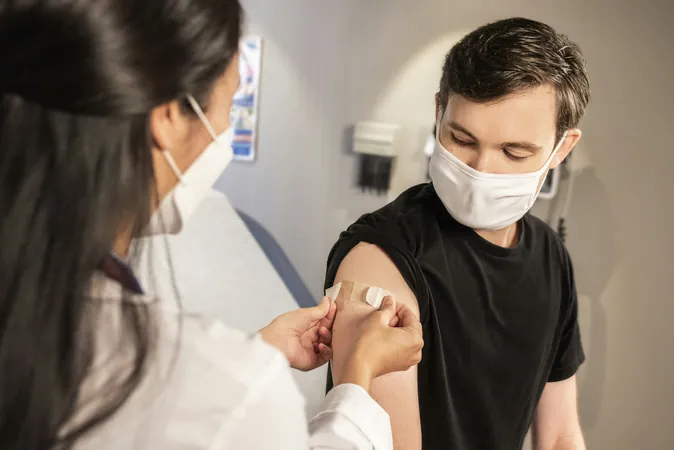
EXPERT INSIGHT: U.S. Vaccine Panel Confronts COVID-19 Safety Concerns
2025-09-18
Author: Benjamin
Vaccines: Myths vs. Reality
Contrary to popular myths, vaccines are proven safe and do not cause autism—a conclusion backed by extensive research involving over half a million children in Denmark. Autism is mainly attributed to genetic factors, which is a crucial aspect of a child's identity rather than a consequence of external influences like vaccinations. The persistent misinformation that vaccines lead to autism, stemming from discredited studies from the late 1990s, not only hurts families but also creates unnecessary fear around vaccination.
Emotional and Financial Toll of Misinformation
The harm caused by the vaccine-autism myth is multifaceted. Parents often blame themselves for their child's diagnosis, causing emotional distress. Moreover, children are deprived of vital immunizations, putting their health at risk. This situation is compounded by the financial strain resulting from wasted research efforts trying to debunk myths that have already been disproven.
Vaccine Panel Under Scrutiny
Amidst a charged atmosphere, Robert F. Kennedy Jr., the new head of the U.S. Department of Health and Human Services, has made controversial changes to the Advisory Committee on Immunization Practices (ACIP), appointing members with limited vaccination expertise. Reports indicate the committee may present data that misrepresents the safety of vaccines using the Vaccine Adverse Event Reporting System (VAERS). This database allows anyone to report adverse events post-vaccination, but it does not ascertain causation.
Potential Changes to Hepatitis B Recommendations
The ACIP's upcoming meeting may also consider altering recommendations surrounding the hepatitis B vaccine, currently administered at birth to protect infants from potentially life-threatening infections. Historical data from 1999 shows that a temporary suspension of this vaccine led to decreased vaccination rates and negative health outcomes for at-risk infants. Any change now could parallel those detrimental impacts.
COVID-19 Vaccine: Safety Profile and Public Health Impact
On the agenda is the COVID-19 vaccine, which has established a solid safety record despite minor side effects such as soreness. Though there have been instances of myocarditis, most individuals recover fully, and the vaccine significantly reduces the risk of severe illness and death from COVID-19. Estimates suggest that over 232,000 COVID-19 deaths in the U.S. could have been avoided with vaccination.
Navigating Misinformation in a Global Context
As the U.S. navigates its vaccine landscape, Australians are observing with concern. It's essential to remain vigilant about the evolving narratives regarding vaccine safety, particularly with the current U.S. government's messaging. However, Australia benefits from bipartisan support for vaccination and trusted experts who ensure vaccine safety based on thorough scientific evidence.
Understanding Vaccine Safety and Reporting Systems
Vaccination safety is continuously monitored through systems like VAERS in the U.S. and similar platforms in Australia. It’s paramount to distinguish between correlation and causation when interpreting data regarding adverse events following vaccination. Despite some reports suggesting a connection between vaccines and unwanted outcomes, rigorous studies consistently reveal that vaccine benefits far outweigh the risks.
The Ongoing Battle Against Vaccine Misinformation
In conclusion, ongoing misinformation can undermine public trust and erode vaccine confidence, resulting in increased cases of preventable diseases. Combating these myths with solid evidence and clear communication is vital for safeguarding public health.









 Brasil (PT)
Brasil (PT)
 Canada (EN)
Canada (EN)
 Chile (ES)
Chile (ES)
 Česko (CS)
Česko (CS)
 대한민국 (KO)
대한민국 (KO)
 España (ES)
España (ES)
 France (FR)
France (FR)
 Hong Kong (EN)
Hong Kong (EN)
 Italia (IT)
Italia (IT)
 日本 (JA)
日本 (JA)
 Magyarország (HU)
Magyarország (HU)
 Norge (NO)
Norge (NO)
 Polska (PL)
Polska (PL)
 Schweiz (DE)
Schweiz (DE)
 Singapore (EN)
Singapore (EN)
 Sverige (SV)
Sverige (SV)
 Suomi (FI)
Suomi (FI)
 Türkiye (TR)
Türkiye (TR)
 الإمارات العربية المتحدة (AR)
الإمارات العربية المتحدة (AR)